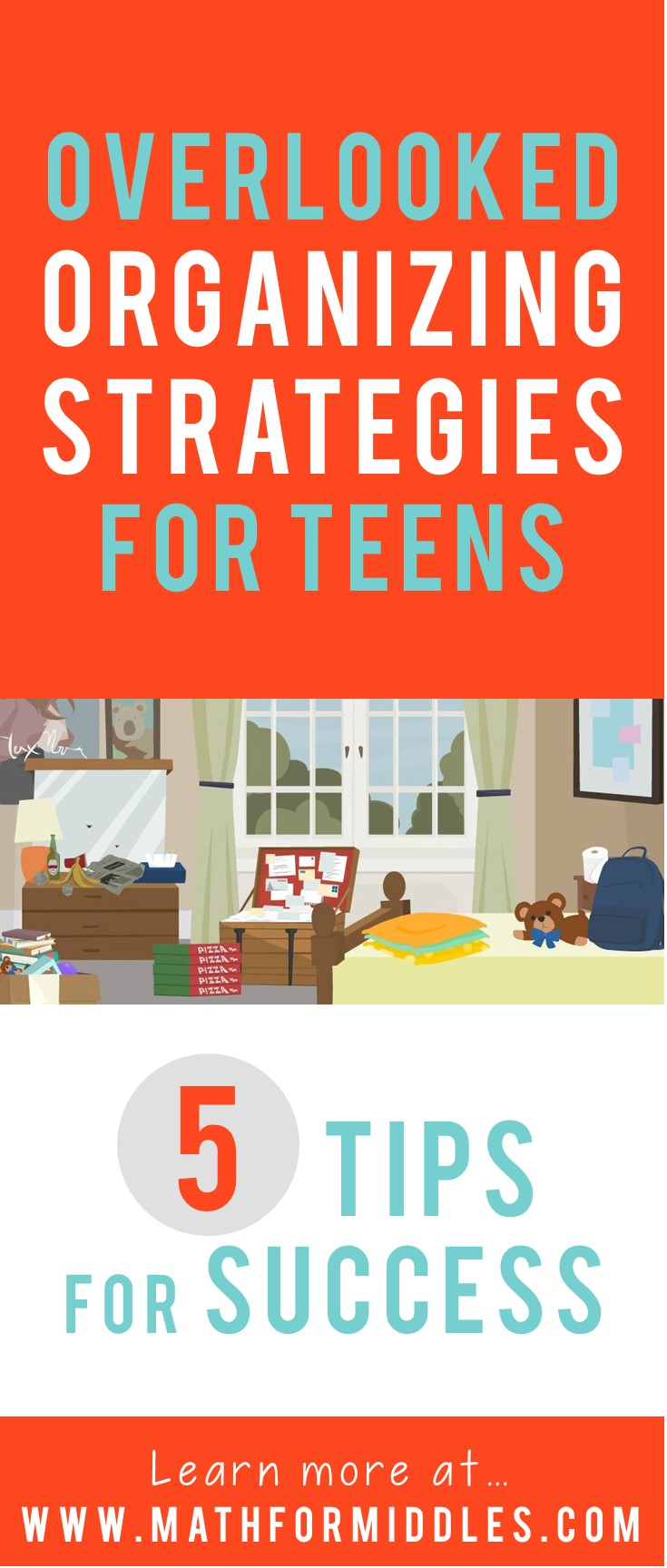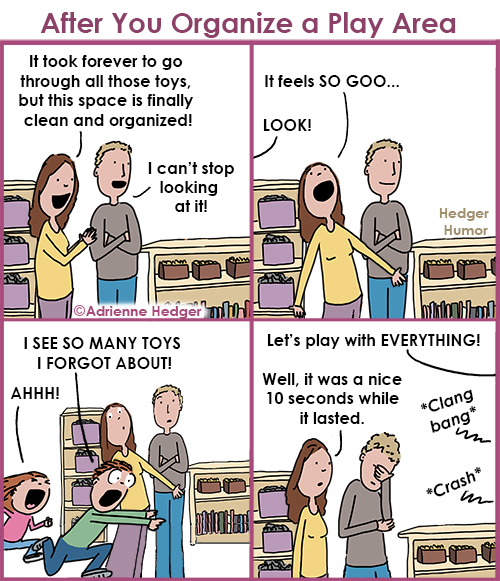Download and Listen to Episode 10
(This is a Google Drive file)
One of my favorite shows is The Middle on ABC as they seem to have the pulse on what it’s like to live in most American homes these days. A good friend of mine once told me, “Sometimes it hits too close to home. It reminds me that I really am this ridiculous.”
During Season 2, the Heck’s decided to take on spring cleaning by moving everything to the front lawn for sorting purposes. They call it quits late that night only to rise the next day to find more junk piled on by the neighbors. This episode definitely touches a pain point for many families including me!
Many of the bad habits we foster in middle school come become increasingly difficult to ditch as an adult. Organization skills are often a pain point for many families that started in their youth. Meet Karen Tennant, a student and family organizer. We discuss on the podcast how we can help our teens be more organized. Read or listen in!
1 – Lack of Organization is most likely NOT the Teen’s Fault
Scientists generally agree that the frontal brain systems play a key role in the development of executive function (organization) skills. These skills help you manage life tasks of all types. From organizing a trip, researching a project, completing a paper for school, to keeping a bedroom clean. During the preteen years, the brain is preparing itself for the development of these skills in later teen years.
The prefrontal systems are among the last to develop and may not be complete until their mid 20’s. So this means we need to have patience with the development of these skills as things are a bit messed up in the front part of the brain. As kids enter middle school, even children with normal functioning may not be able to handle the demands of multiple teacher and classes. There is an increased expectation put on them that they have to be taught to handle.
Keep in mind that some kids are late bloomers and that your strength may be your child’s weakness. We do know that teenagers who practice executive skills are not only learning self-management and independence but are in the process of developing brain structures that will support these skills later in adolescence and adulthood.
2 – Need Systems that Work for the Teen Brain
Karen mentions many systems that need to be looked at. Investigate these 3 areas to find weaknesses and strengths:
Organization
- Leave the backpack; evolve to 1 binder (FREEDOM!)
- Have a homework system integrated with the binder
- Put a study workspace in place—mobile or desk
- Schoolwork Filing System
- Planner and Time Scheduler
- Study Skills
- Accountability with 3rd neutral party (tutor or family friend)
- Test Strategy
- Note areas of continuous improvement
- Weekly meetings
Note from Adrianne: We’ve been doing most of these this school year. We are having much better grades and attitude towards school using the organization tips I shared here.
Planning
- Use a family calendar to plan activities
- Parents need to model good planning strategies
- Be sure to schedule fun activities as well as work and study time
- Use a planner of some kind to schedule important tasks, estimate time, record actual
times, track homework assignments and chores. Check off completed items. - Teach long-term planning for projects breaking into manageable chunks
- Use a whiteboard to map long-term projects into a flowchart
- Prioritize tasks based on due dates and importance
Homework
- Help your kids to prioritize homework based on due dates, and their difficulty level or
the level of stress that will be created - Help them to sequence tasks logically
- Teach kids to review homework and gather materials needed before starting
- Determine the most comfortable place to do homework and have commonly used items
available there - Set up a daily homework time that is consistent.
- Provide verbal reminders until the behavior becomes routine (no matter how
long it takes) - Chunk time with a timer
- Provide verbal reminders until the behavior becomes routine (no matter how
- Sit down every day with child and review homework assignments, setting a plan for the
day
3 – Need a Growth Mindset (Attitude)
Kids will say ”I can do this” or “I can’t do this”. Listen to them and talk about it with no judgment. Adults can help by modeling positive behavior toward difficult tasks. Avoid yelling and nagging. Being angry does NOT help. Display organization yourself in your daily life and housekeeping. What your children see and hear is what they believe to be right and true.
Asking questions can be very revealing. Truly listen as you ask these questions:
- How do you feel when your teacher assigns a project due next week?
- How do you start a project?
- When you start a project at the last minute, do you think it affects your grade?
- How would you feel if you finished a project early?
Use the word YET. When your child complains they can’t do something, get in the habit of encouraging them to add the little word yet to the end of their sentence. “I can’t do this math…yet.” It gives breathing room and shifts the mindset.
4 – Tenacity or GRIT
Grit is passion and perseverance for long-term goals. It’s the ability to stick with something even when it gets hard, loses its luster, or seems to be pointless. Stamina against the displeasure and results that take longer than expected.
Science doesn’t know exactly how grit is obtained, but growth mindset contributes to it. Teach your teen about how the brain develops. Talk about how failure is not a permanent condition, we can find success for ourselves as we stick with things.
- Don’t give up—-keep moving forward
- If you are a 2 parent team, always show a united front even if you don’t always
agree—ALWAYS stick together. - Every person needs a cheerleader—someone who believes in him no matter what
- Stay calm—-anger only promotes more anger
- It’s your child—–NEVER GIVE UP
Note from Adrianne: In our household, we have a family motto: Wholeheartedly and to Completion. This means we give it our best and we finish it all the way. What does that look like at our house? Kids help wash the dishes from dinner AND dry the dishes AND put them away. It’s a quick way to visually see that we finished the task to completion.
Anytime we sign up for a sport, we talk about how they got to give it their all and complete it. Finish it all the way. We are not perfect at this, but we strive to model what completion looks like in our home, work, and community.
5 – Make Every Success Count
- Kevin Leman says, “A little rah-rah never hurt anybody
- When your child does ANYTHING well, celebrate it
- Make sure he is sure that you are proud of WHO he is, not what he does.
- How you think about your child, talk to and about your child, and communicate with her will
establish their trust and your relationship for a lifetime. - Reward each success, no matter how small, with an investment of YOU.
How do I get my teen to “buy into” learning organization?
- Parents must set the example—kids will not “buy in” to something that their parents don’t
value. The kids must also value the goal. Positive reinforcement for a specific behavior shines
a spotlight on the goal, and it helps the child maintain interest and sustain the effort. - What they are about to do isn’t all fun and games. Let him know that you completely believe
in him and hold him accountable. - Respect him for his weaknesses and his strengths. Let him know that excuses only make him
weak. Teens want to feel independent and not weak. - Talk about real life and what he wants from life.
- Bring in a third party such as a teacher/tutor to teach the mechanics of organizing and hold him
accountable during the learning process. Make sure it is someone who will work with the
individual learning/organizing style since everyone is different.
Start with an Easy Win
This may all seem a little overwhelming, but here are some ideas for an easy win to get started with organization:
- Work in tiny steps and use a fun reward for each tiny step
- Use anything positive that happens to the kid whether it is academic or not and celebrate
- Really talk with your teen about something he would like to have or do within reason. Set it as
a goal. Then set tiny steps to move toward the big goal, and celebrate each tiny step until the
big goal is reached - As a parent find out what would feel like a victory for your child
Remember that change of any kind is hard. It will not be quick or easy. It takes action to move forward. Have fun and be courageous and persistent even when you don’t know the outcome.
Parents understand that the student is trying to launch into the future which they need to do. It
is a struggle because habits must change. And it is messy with 1 step forward and 2 steps back
for a while. Celebrate the 1 step forward and encourage during the 2 steps back. Don’t get
discouraged. You’re the parent—You set the tone.
Unfortunately, there is no magic bullet. Parents just need to talk, relate, counsel mentor, and
provide a secure, stable base. Don’t let your teen provoke you into an argument because
neither of you will win.
What Do I Do if I Struggle with Organization?
In order to help the child, the parent must address and understand their own problem of
organization. Children model what they see and hear. A parent can’t expect the child to do well at
organization skills in school if he doesn’t see you setting a good example.
It is best to hire a professional organizer to teach the parent how to organize and maintain that
organized life by putting systems in place. This is the best way to show the student how to use
a system that works best for him. Then hire another or the same professional organizer to set
up a system for the student. They go hand in hand.


Adrianne Meldrum
Owner of Math for Middles



